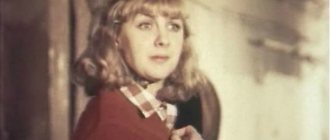Maria Callas Even during her lifetime, her name became legendary. She was admired and feared. However, for all her genius and contradictions, she always remained a woman who wanted to be loved and needed.
What has Maria Callas, one of the most outstanding opera singers of the 20th century, achieved and lost?
As a child, Maria was fat and ugly. But this girl suddenly showed real talent. At the age of eight, she sat down at the piano, and it immediately became clear: she was born to be associated with music. Having not yet had time to really master musical notation, she could already very successfully select various melodies on the piano.
At ten Maria sang her first arias from the opera Carmen by Bizet. This greatly surprised his mother, a former failed pianist. Evangelia began to encourage her youngest daughter to perform at all kinds of children's concerts and matinees.
In 1934, ten-year-old Maria took part in a national radio competition for amateur singers, taking second place and receiving a wristwatch as a gift.
First success
Believing that it will be difficult to succeed in America, her mother transports thirteen-year-old Maria to Greece. There, Callas quickly studied the Greek language, which was completely unfamiliar to her, and, lying that she was already sixteen, she entered first the National Conservatory, and two years later, the Athens Conservatory. Her new teacher is the famous singer, owner of a beautiful coloratura soprano, Elvira de Hidalgo, who later replaced both her mother and her first friends.
Maria Callas: life chronology
In 1940, Callas made her debut on the stage of the Athens National Opera. One of the leading singers of the theater unexpectedly fell ill, and Maria was offered the main role in Puccini's opera Tosca. At the moment of entering the stage, one of the workers said loudly: “Will such an elephant be able to sing Tosca?” Maria responded immediately.
Before anyone even had time to come to their senses, blood from his own nose was already gushing onto the torn shirt of the offender. Unlike the stupid worker, the audience was delighted to hear the excellent performance. Critics echoed her, publishing laudatory reviews and enthusiastic notes in their newspapers the next day.
In 1945, Maria decided to return to America, where her father and... uncertainty were waiting for her.
Traitor
Maria first met the billionaire in the late fifties in Italy, at a party after the performance of Norma. Six months later, the billionaire invited the singer and her husband to ride on his famous yacht “Christina”. By the end of this journey, Callas's marriage with Meneghini was at an end. And this despite the fact that Onassis himself at that time was also in a relationship with Tina Levanos . It was she who caught the newly-made lovers and made their romance public. To get a divorce, the singer renounced her American citizenship and adopted Greek citizenship. “I did this for one reason: I want to be a free woman. According to Greek law, anyone who, after 1946, got married outside of a church is not considered a married person,” Maria told one of the journalists, who during that period of her life became more active than ever.
Unlike the singer's ex-husband, Onassis was indifferent to opera. He did not understand Maria’s desire to sing and more than once suggested that she stop her career. One day she actually stopped going on stage, but not for the sake of Aristotle. This is how the circumstances developed: voice problems, general fatigue, a break in relations with the Metropolitan Opera and leaving La Scala. A new period in her life began: bohemian. But he did not make the artist happy. Neither did Aristotle. The businessman needed Callas for his image. The billionaire had no intention of marrying her and even forced her to have an abortion when she became pregnant. Having taken everything he needed from the singer, Onassis successfully found himself a new object of desire: Jacqueline Kennedy . He married the widow of the 35th President of the United States in 1968. Maria learned about what happened from the newspapers. Of course, she was in despair, because she herself dreamed of being in Jacqueline’s place. By the way, after the wedding, the businessman did not stop his meetings with Maria, only now they were secret. And during his honeymoon in London, he called the singer every morning, giving hope for the continuation of the relationship.
The only medicine that could save the diva from depression was work. But by that time, the artist’s voice was no longer the same, so she began to look for new ways of self-realization. First, Maria starred in Pasolini's film Medea, although it was not a box office success. Then she directed an opera production in Turin, and also taught at the Juilliard School in New York. Unfortunately, the singer did not receive satisfaction from all this. Then Callas tried to return to the stage with the famous tenor Giuseppe Di Stefano. The public greeted the creative tandem very warmly, but during the tour Maria was dissatisfied with herself, her voice betrayed her, and critics wrote unpleasant things. As a result, the attempt to resume her career also did not make her happier and could not help her forget the betrayal of Aristotle.
At the end of her life, the legendary diva turned into a real recluse and practically never left her Parisian apartment.
The circle of those with whom she communicated was sharply reduced. According to one of Callas’s close friends, at that time it was impossible to reach her by phone, as well as arrange a meeting, and this repelled even the most devoted people. On September 16, 1977, the famous opera singer died at about two o'clock in the afternoon from cardiac arrest in her apartment. According to Mary's last will, her body was cremated. Photo: Commons.wikimedia.org
Millionaire from Verona
Success in Greece turned out to be practically nothing for American producers. After two years of failure, she meets Giovanni Zenatello, who offered her the role of Gioconda in the opera of the same name. And for a long time, Maria’s life was connected with Italy.
It was in Verona that she met local industrialist Giovanni Batista Meneghini. He was twice her age and passionately loved opera, and with it Maria. Throughout the season, he brought her huge bouquets of flowers every evening. This was followed by public appearances and declarations of love. Giovanni completely sold his business and devoted himself to Callas.
Maria Callas
In 1949, Maria Callas married a Verona millionaire. Batista became everything for Maria - a faithful husband, a loving father, a devoted manager, and a generous producer. Meneghini also agreed with the famous conductor Tullio Serafin to take his wife to study. It was Tullio who opened Callas to the world stage and subsequent generations of classical music lovers. In 1950, the whole world was already talking about it. She is invited by the legendary Milanese La Scala theater, followed by London's Covent Garden and New York's Metropolitan Opera.
Controversial image
With the advent of popularity, Callas begins to form her new stage image, which will become her calling card over the next twenty years.
She goes on an unprecedented diet, as a result of which she manages to lose thirty-five kilograms. Her character also underwent metamorphosis.
Callas has always been hardworking and meticulous when it comes to art. It infuriated her if she saw that someone gave less to art than she did. It was then that Callas’s reputation as a brawler was established.
The situation was complicated by the administrators: they believed that Maria should always be in shape. A scandal broke out when the President of the Republic appeared at a production of Norma in Rome. Even before the performance began, Maria felt unwell and offered to replace her with another performer, but the theater administration insisted on performing. Having somehow sung the first act, she felt even worse. In order not to completely lose her voice, Maria refused to continue the performance. However, the newspaper men presented everything in their own way.
“Not paying attention to my health, they began to talk with all their might about my bad character,”
– Callas will say later.
Crucial moment
The scandal in Rome marked the beginning of the decline of the great singer’s career. The day before the premiere of Bellini's opera The Pirate, Callas underwent surgery. The recovery period was very difficult. Maria did not eat anything and stopped sleeping almost completely. Despite the severity of her condition, she took the stage at La Scala and, as always, was incomparable. The audience began to greet their goddess. But the theater management thought differently.
Maria Callas
At the very climax, when Maria was ready to come out from behind the scenes, a fireproof iron curtain fell onto the stage, completely shielding her from the enthusiastic spectators. For Callas, this was an unequivocal sign.
“It was as if they were telling me: ‘Get away! The show is over!
– she admitted in one of the interviews. With a heavy heart, she leaves Italy and concentrates her energy on performing in America.
For Maria, the crisis in her professional life coincided with no less dramatic events in her personal life. Batista Meneghini turned out to be a good impresario, but not the most successful husband. His attitude towards Callas was more reminiscent of fatherly care than the full-fledged love of a man for a woman.
Childhood
Maria Callas was born on December 2 in New York City, into a family of Greek immigrants. The girl's father was a military man and was blown up by a mine, just a few weeks before the birth of the child. Over the years, the mother worked as a teacher at school, and also tried with all her might to teach her daughter the art of music - something that she herself dreamed of at one time, but was unable to learn due to the difficult situation in the family.
Thus, young Maria was taken to theaters from early childhood and taught to play the piano. By the way, the girl had an excellent ear for music, so the lessons were easy for her, and the process brought great pleasure.
Initially, the mother took the girl to a music school located in New York itself, where the family lived. However, urban education at that time was not so good, so the caring parent dreamed of returning to her historical homeland, where her daughter could become not only a professional musician, but also a very famous person.
However, such an opportunity presented itself only in 1936, and the mother, having promised the child a great future in the musical field, happily moved to Athens, where she sent Maria to a specialized school for talented youth.
Golden Greek
In 1958, Maria was invited with her husband to the annual Venetian ball hosted by Countess Castelbarco. Among other guests, the Greek tanker king Aristotle Onassis and his wife Tina were also present. Always a lover of everything beautiful and world famous, Ari was intrigued by the opera diva.
Trying to charm Callas, Onassis resorted to his favorite tactic - he invited Maria and her husband to his luxurious yacht “Christina”. Callas noted that she would gladly accept this invitation, but is forced to wait for now due to her busy tour schedule. For example, now she will perform at London's Covent Garden. Aristotle, who always had contempt for opera, surprised his wife when he quickly said: “We will definitely be there!”
Hearing this, Giovanni experienced a strange feeling of fear and regret, as if foreshadowing the beginning of the end of their family life. There was too much in common between the kindred Greek souls of Aristotle and Mary. It seemed that they had found each other in this endless whirlwind of a hectic life.
What do you know about Maria Callas?
Signor Meneghini's premonitions did not deceive him. As Ari promised, he attended the premiere, organizing a luxurious banquet in honor of the opera goddess after the performance. One hundred and sixty people - the most significant and influential people in the United Kingdom - received an invitation that read: "Mr. and Mrs. Onassis have the honor to invite you to dinner, which will take place at the Dorchester Hotel on June 17th at 11.15 pm." Ari also sent the forty most eminent guests tickets to the performance itself, which were worth their weight in gold at that time.
The celebration continued until the morning. At the end of the banquet, Maria, nevertheless yielding to Onassis’s pressure, agreed to accept his invitation to a cruise in the Mediterranean. Stepping onto the deck of the Christina, Maria took a step into a new era of her life.
Maria Callas and Aristotle Onassis
The luxurious yacht, which looked more like a floating museum than a vehicle, set sail from the pier in Monte Carlo for a three-week luxury voyage. Callas was not the only guest of honor on this cruise.
Besides her, the great Winston Churchill was also present with his wife Clementine, daughter Sarah, personal physician Lord Moran and beloved canary Toby. When the Christina landed at Delphi, the distinguished company took a pleasant walk to the Temple of Apollo. Everyone was in a pleasant mood, languishing in anticipation of the famous prophecies.
But this time the Delphic oracle struck everyone with silence. And what could he predict? The patriarch of world politics, Sir Winston Churchill, faced the end of his life, Tina faced a divorce from Aristotle, Onassis himself faced the death of his son and an unsuccessful marriage with Jacqueline Kennedy, Maria faced the tragic end of a stellar career, and Giovanni Meneghini, who sacrificed everything for his wife, faced a scandalous divorce and sad memories of former happiness. Needless to say, the Delphic oracle acted wisely.
During the cruise, Onassis used all his charm to seduce Maria. And she gave up... And immediately, not accustomed to hiding her thoughts and feelings, she informed her husband about this:
“It’s all over between us. I'm crazy about Ari."
In the power of Eros
The relationship with Aristotle Onassis was the most exciting in the life of the opera goddess. He became her first love, as strong as it was late.
Maria tried to delve into all aspects of her loved one’s life. Unlike his first wife, Maria could go into the galley without any warning before dinner began and personally see how the cooking process was going on.
Such obsession caused a lot of concern for Onassis's chef Clement Miral. He was especially horrified when Callas, with the air of a sophisticated gourmet, lifted the lid of some gourmet dish and, dipping a piece of bread into it, tasted it. To Miral’s astonished question what he would say to his boss when he found pieces of bread on his plate, she answered lightheartedly:
“Tell him it’s his new mistress’s fault!”
When information about the relationship between Callas and Onassis was leaked to the press, a social scandal erupted.
Onassis's wife Tina immediately took her children - 12-year-old Alexander and 9-year-old Christina - and disappeared in an unknown direction. Driven into a corner, Onassis outwardly remained calm and answered questions from reporters:
"I'm a sailor, and these things can happen to sailors from time to time."
Deep down, Ari was quite concerned about the current situation. Having learned through his channels that Tina was hiding with her father, the Greek shipowner Stavros Livanos, Aristotle began to besiege his wife, trying to explain that Callas was just an intelligent and devoted friend for him, helping him in solving business issues. It is unlikely that Tina could be convinced by an obvious lie. And Meneghini began to get nervous when he realized that Maria would no longer return to him. The abandoned spouses - Giovanni and Tina - filed for divorce.
Maria Callas
Many influential friends of Aristotle were drawn into the high society scandal. They even tried to involve Onassis’s close friend Whiston Churchill in the ugly showdown. But he only snorted with displeasure and muttered something not entirely understandable under his breath. Issues of family and marriage always meant little in the life of the patriarch of world politics, but with the onset of old age, burdened by melancholy and depression, there was absolutely no place left for them.
These were not the best times for both Onassis and Maria. Aristotle rushed between two women, while Maria tried to get used to her new role as a mistress. It was as if their feelings were being tested for strength.
And they passed this test with honor. In 1960, both became free.
Husband and producer
Giovanni Battista Meneghini was 27 years older than Maria, but this did not stop him from marrying the young singer. The couple walked down the aisle less than a year after they met. The businessman became Callas’s husband and manager rolled into one. For the next ten years, the opera diva and the wealthy industrialist walked through life hand in hand. Of course, Meneghini provided his wife with strong financial support, which contributed to Maria’s already brilliant career. But the main secret of her demand was not her husband’s money, but her impeccable command of technology. Our famous opera singer Elena Obraztsova once said about this: “Callas did not have a beautiful voice. She had a fantastic singing technique and, most importantly, sang with her heart and soul. She was like a guide from God.” After Verona, the doors of all famous opera houses gradually began to open for the girl. In 1953, the artist signed a contract with the major record company EMI. It was this company that released recordings of operas performed by the singer.
From the very beginning of her career, Maria was quite large. Some ill-wishers and envious people called her fat. Weight problems arose due to a great love for food. The artist’s secretary, Nadya Stanshaft, talked about her: “We were setting the table, she came up and innocently asked: “Nadya, what is this?” Can I try a small piece?’ This was followed by another and another. So she practically ate everything that was on the plate. And then I tried it from every plate of everyone sitting at the table. It drove me crazy." Maria's favorite treat was ice cream. It was this dessert that should have ended absolutely every meal of the singer. With such an appetite, Callas had every chance not only to become famous as an opera performer, but also to become the fattest woman in the world, but, fortunately, she stopped in time. While working on the role of Violetta in her favorite La Traviata, the girl lost a lot of weight and became a real beauty, whom the famous womanizer Aristotle Onassis could not ignore .
Aristotle Onassis and Maria Callas. Photo: Frame youtube.com
Free swimming
Maria was optimistic about the changes that had taken place. She finally belonged to herself and to someone else, very valuable and dearly loved. She admitted:
“I lived for too long with a man much older than myself, it even began to seem to me that I was aging ahead of time. My life passed as if in a cage, and only when I first met Aristo and his friends, radiating all the diversity of life, did I become a completely different woman.”
New life horizons opened up before her. And soon Callas discovered that she was pregnant. A new chapter began in the book of her life, the distinctive features of which were to be home comfort, cheerful children's cries and the tender embrace of her beloved man. And work - her favorite work - could not help but take revenge on the singer for such inattention. Suddenly, her unforgettable voice began to change, and she could not do anything about it. Years later Maria would say:
“For the first time, I developed complexes, and I began to lose my former courage. Negative reviews had a terrible impact, leading me to writer's block. For the first time I lost control of my own voice.”
More than ever, Callas needed help, advice and support. She turns to the person closest to her - Aristotle. But it seems that this was an unsuccessful candidate. Onassis is too far from the problems of art and the mental torment of his beloved. The situation could have been changed by having a child together, but even here Callas was in for bitter disappointment. The boy, whom she named Homero, was stillborn. She had only one thing left: to try to regain her former glory and marry Aristotle, acquiring the status of an official wife and homemaker.
Maria Callas: - 36 kg
Just like with her voice, she had to work hard and seriously on her body - she lost almost 36 (!) kg. When her career was already in full swing, Maria weighed about 100 kg with a height of 174 cm. The weight could be attributed to the characteristics of the profession. Opera is also called the art of fat people. Some people think that thin opera singers have a voice that is not so soft and rich, others that when opera singers sing, the diaphragm puts pressure on the stomach, causing a false feeling of hunger and, accordingly, forcing you to eat... It doesn’t matter. Maria’s weight problems, it seems to me (and many researchers of her biography agree with me), were elsewhere. Callas was born in New York in 1923 to a family of Greek immigrants. From the age of three, at the behest of her mother, Maria listened to classical music; at the age of five she began taking piano lessons, and at the age of eight, vocal lessons. In 1936, the mother moved with the children to Greece to continue Maria's musical education. In 1940, at the beginning of World War II, Greece was captured by the Nazis. The Callas family, like many others, was overtaken by beggary and hunger.
Maria was only 17 when she fell into the meat grinder of war. Biographers claim that the family had to eat “literally out of garbage cans,” and Maria had to sing on the street to collect even a little food. This could not but affect Callas’s attitude towards food. Hunger made itself felt later - after the war, the singer threw gourmet orgies. Callas on the far left
“Maria considered it sacrilegious to throw away a piece of bread even when she was rich, because of her wartime experiences,” says Maria’s friend and biographer Nadya Stanikova.
At the beginning of her career (late 40s), Callas was a rather curvaceous woman. She herself said: “Large... Yes, you can say so. But I was also a tall woman - 173 cm, and usually weighed no more than 91 kilograms." Some critics contemptuously called her “a prima donna with elephant legs.” Tito Gobbi (Italian opera singer) said that during lunch when Lucia was recording in Florence, Serafin (Italian conductor) remarked to Callas that she was eating too much, which made her weight a problem. When she objected that she was not that heavy, Gobbi invited her to test the theory with practice by standing on the scales located next to the restaurant. The result was "somewhat frightening, and she immediately became quiet." Callas on the left (you can also appreciate her height):
In 1968, Callas told Edward Downes (British conductor) that during her first performances of Cherubini's Medea in May 1953, she realized that she needed a thinner face and figure for "dramatic correctness" both for this and others she played.
“I became so fat that even my singing became harder. I started to get tired of myself. I sweated a lot and found it extremely difficult to work. I had health problems and could not move freely. And then I got tired of playing the game. For example, playing a beautiful girl when she herself was a heavy woman who had difficulty moving. Either way, it was uncomfortable and I didn't like it. So, I feel now that I'm finally going to do everything right - I've been learning my whole life to do everything right musically, so why don't I go on a diet and make myself presentable?"
From 1953 to early 1954, Maria lost approximately 36 kg (she now weighed 57 kg), transforming herself into what Maestro Recinier (Italian-American conductor) called “perhaps the most beautiful lady on the stage.” Callas recorded her achievements in gaining a beautiful figure next to the stage ones: “La Gioconda 92 kg; Aida 87 kg; Norm 80 kg; Medea 78 kg; Lucia 75 kg; Alcesta 65 kg; Elizabeth 64 kg.” Rudolf Bing (head of the Metropolitan Opera), who remembered how “monstrously fat” Callas was in 1951, stated that after losing weight, Callas became “an amazing, slender, amazing woman” who “had none of the signs of being fat.” a woman who had lost weight: she looked as if she had been born with a slender, graceful figure and always moved with extreme grace.”
However, Karl Lagerfeld recalls that he once saw Maria dressed in bright green trousers and a sweater.
"It was terrible! Her figure was not designed for trousers,” says the designer. Callas in jeans:
But no one looked at what she was wearing. An aura of legend surrounded her. “We saw a myth come to life.” “She sought to convince the world that her elegance and popularity were innate. She has certainly never played a more difficult role,” says Lagerfeld. There were many rumors about Maria's weight loss method. One of them is that she swallowed a tapeworm. And Rome's Pantanella Mills, the company that made the pasta, claimed that Callas lost weight by eating their "physiological pasta," forcing Callas to file a lawsuit against them. After her death at a fairly young age (53 years old) from a heart attack, as well as loss of voice, many suspected Callas of bulimia, but this version was not confirmed.
Maria herself said that she lost weight on a reasonable low-calorie diet, consisting mainly of salads and chicken. Maria's ex-husband recalled that Maria was on a strict diet, which she did not break. She ate only meat (and in large quantities), as well as raw vegetables without salt and oil, “like a goat.” I didn't drink alcohol, just a little wine. Some believe (and still do) that the weight loss made it harder for Callas to maintain her voice, which became noticeable later in the decade, while others believed that the weight loss brought softness and femininity to her voice, and has also made her more confident as a person and a performer. Tito Gobbi said: “Now she is not only a supremely gifted musically and artistically, she is also a beauty. And her awareness of this enveloped every role she played with original (original, new, fresh) magic.”
Callas retained her beautiful figure until the end of her life.
The same cannot be said about her beautiful voice. A series of stressful situations in life (divorce, break with the Metropolitan Opera, loss of a child, unhappy love for Aristotle Onassis...) led to Callas losing her voice in the early 60s. At this point her brilliant career broke down. Five years later, she tried to return to the stage, but it did not bring her the same success. 1965 1973 (Maria passed away in 1977
) “I lost weight, voice and my loved one...” Callas recalled. Despite this, she will forever remain in the history of the 20th century as a great opera singer, a subtle, refined beauty with a strong character. An excerpt from the opera film “Medea”, in which Callas played and sang the main role. Not her best vocal performance, but you can not only listen, but also watch her play (there are few videos left of Maria on stage):
First lady
Maria Callas and Aristotle Onassis
After painful divorce proceedings, Aristotle and Maria began to appear together in society without any hesitation. One of the witnesses of their next date in a Monte Carlo nightclub recalled:
“They can’t dance cheek to cheek because Miss Callas is slightly taller than Mr. Onassis. Therefore, when they dance, Maria bows her head and lightly plucks her lover’s ear with her lips, thereby causing him to laugh enthusiastically.”
Seeing how rapidly the relationship between the lovers was developing, everyone lived in anticipation of a new luxurious wedding. However, neither Mary nor Aristotle rushed things. Answering annoying questions from an Italian magazine, Callas was evasive and secretive:
“I can only say one thing: there is a very tender and sensitive friendship between me and Mr. Onassis.”
But, despite all expectations, the marriage never took place - neither in 1960 nor after. Three years after the divorce, a new woman will appear in Onassis’s life, to whom he will offer not only his hand and heart, but also a fair share of his fortune.
In the summer of 1963, Aristotle invites the first lady of the United States, Jacqueline Kennedy, to his yacht “Christina”. Even before meeting Mrs. Kennedy personally, Onassis was intrigued by her image, which combined beauty and high position in society.
And when Jackie stepped onto the deck of his yacht, he showered her with gifts. When the First Lady returns to the White House, one of her husband's aides will remark:
“Stars were shining in Jackie’s eyes—Greek stars!”
Callas did not immediately recognize Mrs. Kennedy as a threat. Maria was sure that Onassis would never go against the President of the United States for the sake of another love affair. The situation changed dramatically after the tragic shootings in Dallas.
After John's death, Aristotle begins to actively court Jacqueline. Now with her he began to make lonely voyages on the “Christina” in the Aegean and Mediterranean seas. Callas was alarmed, but it was not in her power to change anything. Jackie is younger than her and even more famous. Onassis's attitude also changed. Instead of a constant companion, he turned for Maria into a random travel companion who visited her from time to time.
Maria Callas
Sometimes these visits were very exciting both for Callas and for Ari himself. One day, succumbing to momentary pleasure, he agreed to take Mary as his wife. Preparations for the wedding, which was decided to take place in early March 1968 in London, took place in an atmosphere of the strictest secrecy.
At the last moment, Callas was horrified to discover that she was missing her birth document. The duplicate was ready two weeks later, which became fatal in the life of the great singer. Just a few minutes before the start of the wedding ceremony, she quarreled with her groom, losing him almost forever. In June of the same year, Onassis played another wedding, only the bride at it was not Callas, but the former first lady of the United States, Jacqueline Kennedy. The most tragic stage in Maria's life began.










